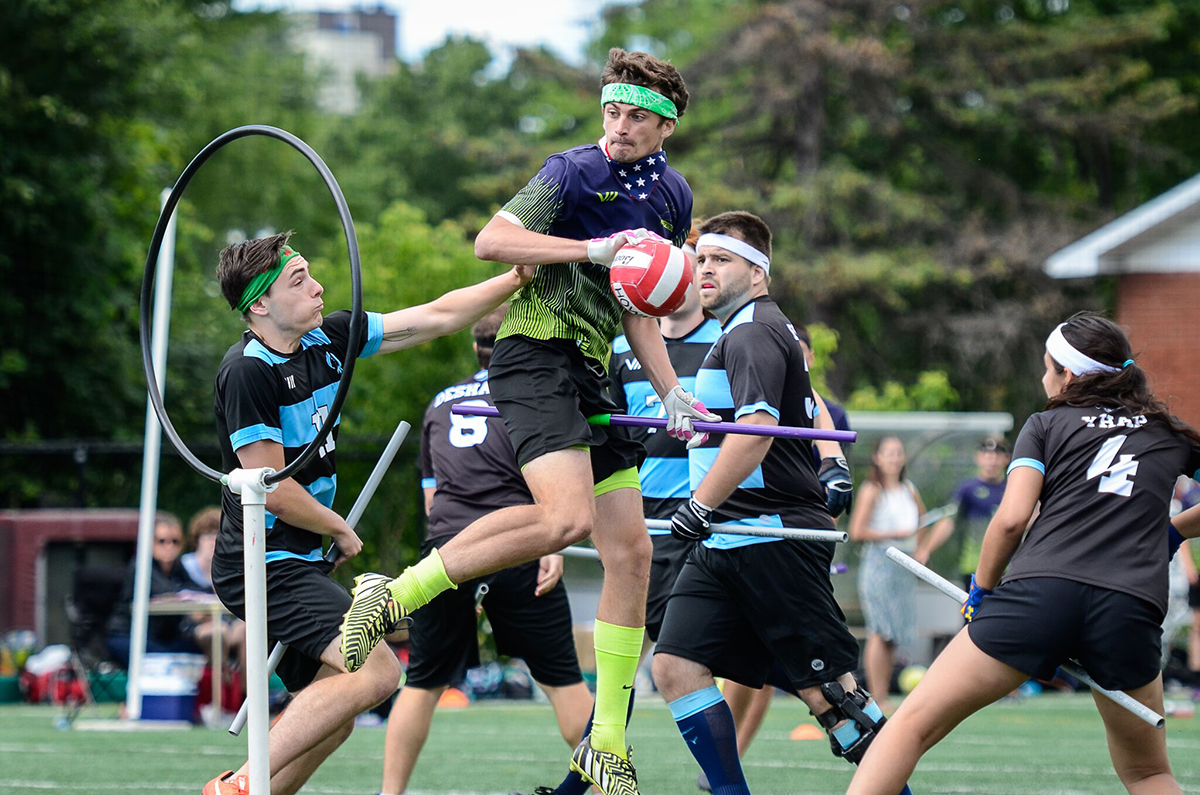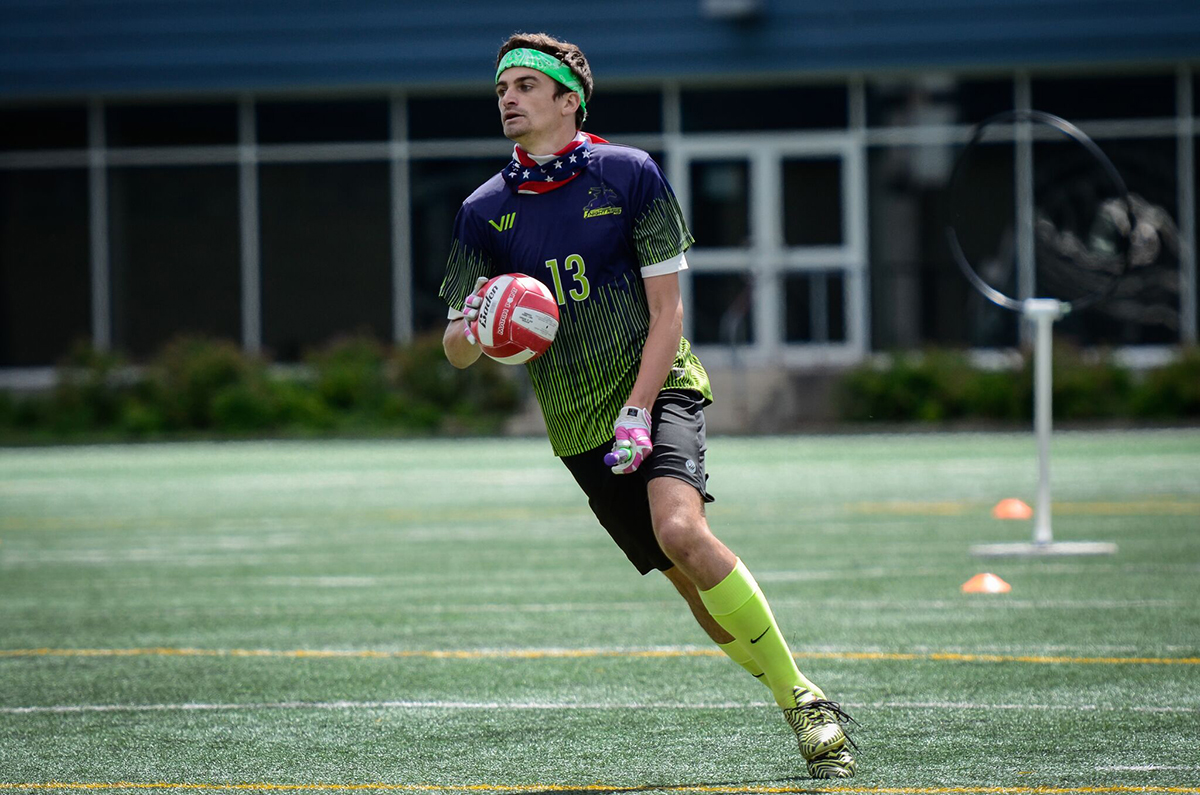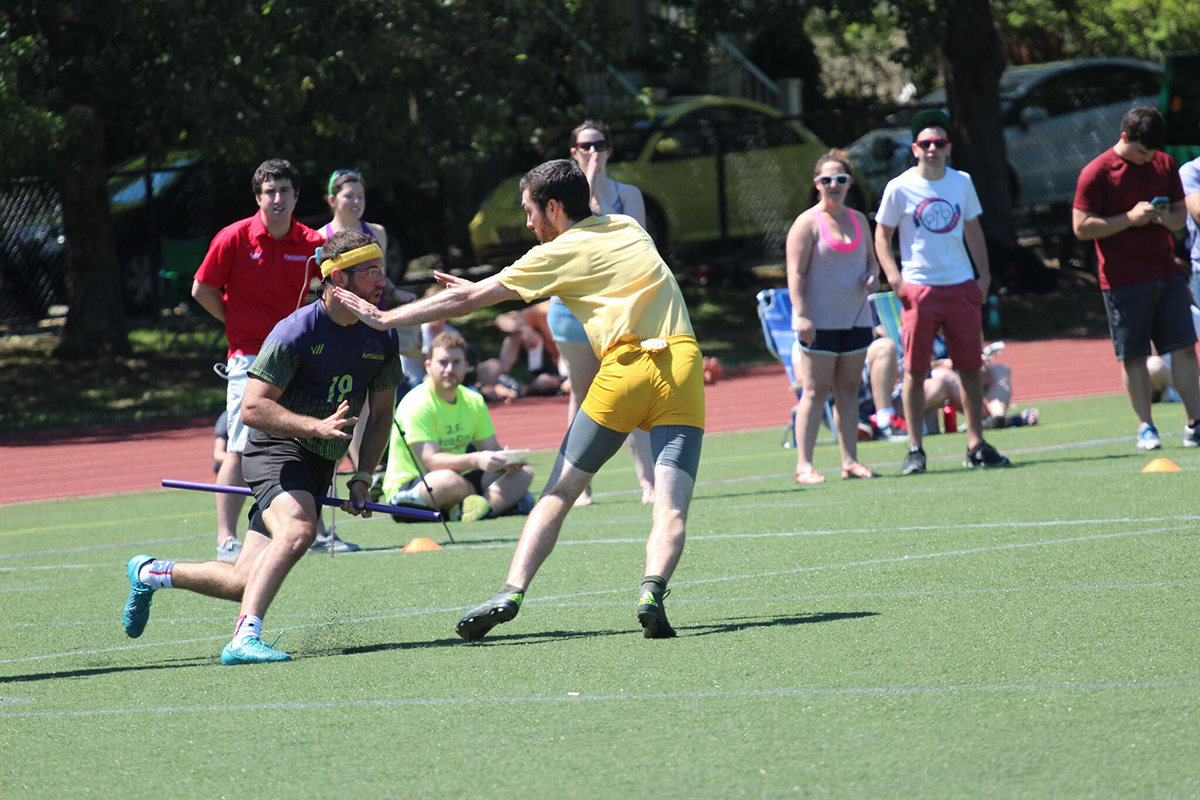As Quidditch Gets Serious, Boston’s Team Leads the Way
Update, August 22, 10 a.m.: The Night Riders won the second annual Major League Quidditch championship.

The Night Riders duke it out against the Ottawa Black Bears. / Photo by Ben Holland
If Boston is known for doing one thing, it’s winning. And while it may not be one of the big four, the sport of Quidditch is no exception.
Meet the Night Riders. Named after Paul Revere’s midnight ride, Boston’s Quidditch team won its league’s first-ever championship last summer. Given their strength and current record, they could do the same this coming August.
With an all-star lineup and a former wrestler coach who takes no excuses, the Night Riders is a team unlike any other that Quidditch has seen before. Even during a casual weeknight practice at Harvard Stadium at dusk, with only about half of the team present, the Night Riders’ side of the turf took on an intensity that matched, if not exceeded, the side occupied by Harvard’s football team.
“Physical, physical, physical! Let’s go kill!” Coach and player Harry Greenhouse’s voice can be heard through the historic stone bleachers as he prepares the team for their next scrimmage.
That’s not to say they don’t have fun, of course. The team’s routine includes getting wings after practice once a week, playing Kan Jam, and having puppets as mascots.
But make no mistake: the Night Riders are fiercely competitive, and they’re taking the sport to new heights.
The goal is to win. A lot of teams like to have fun, but the underlying theme is that the most fun thing there is, is winning.
First, a primer. For the culturally out of touch, Quidditch is a sport originating from the wildly popular Harry Potter series. The rules of Quidditch are adapted as closely as possible from J.K. Rowling’s imagination to a functional sport in the real world: Potterheads will recall a game on broomsticks with nearly as many layers as the Wizarding World itself.
Here’s how it translates into Muggle speak: an epic fusion of rugby, dodgeball, and capture the flag. Overlooking their inability to fly, players must have a broomstick between their legs at all times of play. Like in the books, there are seven players from each team on the field at once; the sport is co-ed and full contact.
Played on a 48-by-72-yard field, the Chasers, who are offensive players, try to score by throwing volleyballs through three vertical hoops planted in the ground, with each goal worth 10 points, while the Keeper guards the hoops. The Beaters throw dodgeballs at the other players, who are out of play until tagging their side’s goalpost once hit.
Eighteen minutes into the game, the Golden Snitch is released. The Snitch’s translation into reality is a tennis ball inside a sock attached to a neutral player dressed in all yellow. The first Seeker to grab the Snitch ends the game and earns their team 30 points.

Boston Night Riders captain Jayke Archibald. / Photo by Ben Holland
The Boston Night Riders are part of Major League Quidditch, a recently formed national league that runs June through August. Founded last summer by Tufts University graduate Ethan Sturm and New York University graduate Amanda Dallas, editors of the Quidditch analysis website “The Eighth Man,” the league aims to bring competitive Quidditch to the summer season, make the sport more consumable for fans through live streaming, and increase the sport’s professionalism.
They’re achieving this by doing what no Quidditch league has done before. Through their website, spectators can access high-quality live streams of games and even play fantasy Quidditch like one would play fantasy football. Another characteristic feature of MLQ is its exclusivity. Unlike the US Quidditch League, which any team with enough players can join, MLQ decides how many teams it has, the cities they’re based in, and the managers of each team. Each manager then selects coaches, who hold tryouts and select 30 players, allowing MLQ to compile top talent.
In order to reach these goals, MLQ has partnered with brands like Savage that make their uniforms, brooms, and hoops. Additionally, they sell tickets to the championship game and rely heavily on volunteers. Each team also must pay dues to MLQ.
“We really feel we are the most professional presentation of Quidditch there is right now,” Sturm says. “But we also understand that we’re not paying people salaries, so while we’re not full-on professional right now, we are trying to be as professional as we can be and continue to raise that bar going forward.”
MLQ has 16 teams total, including West, East, North, and South divisions, with teams in Boston, New York City, Ottawa, Washington, Cleveland, Detroit, Indianapolis, Rochester, Austin, League City, Kansas City, New Orleans, Los Angeles, Phoenix, Salt Lake City, and San Francisco. Teams play within their regional divisions for the summer, until the championships in August at Lake City, Texas.
Sturm says the word on the street in the Quidditch community is that MLQ’s Boston and Austin teams this season might be the best ever put together in the existence of the sport.
Boston has always been a top hub for Quidditch. The strong programs at Emerson College, Tufts University, Boston University, and Harvard University comprise a competitive community whose grads form the base of the regular-season city team, Quidditch Club Boston.
By racking up top players from all of these teams during the summer, the Boston Night Riders easily created a competitive roster. Their serious leadership, though, is what really sets them apart. Captain and Keeper Jayke Archibald describes the hardcore coaching style of Greenhouse: “He has an entire warmup routine that he does, which is kind of crazy to watch, but he looks like he’s mad, and everyone knows not to talk him. … If you haven’t seen it before, people are kind of like, ‘Oh. That’s who we’re playing against.’”

Coach Harry Greenhouse approaches the Golden Snitch. / Photo by Loring Masters
Being a part of such a successful team isn’t easy. Some players struggle to adjust to the intensity of the Night Riders, compared to the goofier, more fun-loving approaches of their college teams, and conflict is bound to brew up when so many stars are thrown together, Archibald says.
“The goal is to win. A lot of teams like to have fun, but the underlying theme is that the most fun thing there is, is winning,” Archibald says.
Playing a sport this aggressively and competitively doesn’t come without sacrifice. While Quidditch players say the game is no more dangerous than other contact sports, injuries are fairly common. The number one injury in the game? Concussions. Given the tackling and lack of helmets, this should come as no surprise. Yet few outsiders have come to recognize the intensity of the game.
In the event that there’s a guy who doesn’t think a girl will tackle him to the ground—I love that. I love being underestimated.
Chaser Julia Baer, the Night Riders’ lead scorer in last year’s finals, has landed in the hospital a couple times and had her share of injuries. These include becoming blind in her left eye for multiple days after being hit in the face by a bludger, spraining her ankle twice, having her shoulder separated, and getting a concussion. Last year, playing with mouth guards became a new requirement.
While some critics would say that the co-ed aspect of Quidditch only adds to the dangers of the game, especially for smaller female players, the Night Riders have found that on a team of top athletes, women and men are evenly matched—and often women can be fiercer than their opponents expect.
“I find, in the event that there’s a guy who doesn’t think a girl will tackle him to the ground—I love that,” Baer says. “I love being underestimated. There are so many female stars who completely outshine their male counterparts on the field.”
First played at Middlebury College in 2005, Quidditch has evolved over the past decade, taking twists and turns no one expected. Team members of the Night Riders who have been playing for years have witnessed and even shaped this evolution.
A significant turning point has been the transition from a cosplay-style game to a legitimately athletic sport. Shedding the capes and witchy hats, a decade later, Quidditch has emerged sleeker, played on PVC “brooms” without bristles, branching away from its Harry Potter roots into a game of its own merit.
In terms of the athletic evolution of Quidditch, Archibald says that Beaters specifically have adapted their strategy to include offensive tactics, tackling and utilizing knockouts to create lanes and channels for Chasers to weave through as they dash up field. A Beater who has specifically revolutionized the game? The Riders’ own Max Havlin, who often says his goal is to “break the game.”
Who would’ve thought a fictional sport could actually take flight? And it’s only started soaring. Compared to a game with similar roots, Ultimate Frisbee, which took decades to gain mainstream popularity, the growth of Quidditch has been exponential in just a few years—it’s already played at more than 200 colleges and universities in the US and more than 30 countries worldwide.
Only time will tell what heights Quidditch will reach. Maybe one day we’ll see it at the Olympics.
Saturday, July 30, the Night Riders will host a three-game series against the Washington Admirals at Harry Downes Field in Brookline from 3-6 p.m. The free, public event is the final series of the regular season for the Boston Team. They’ll be defending their undefeated record. The 2016 Major League Quidditch Championship will be held August 20-21 in League City, Texas.


